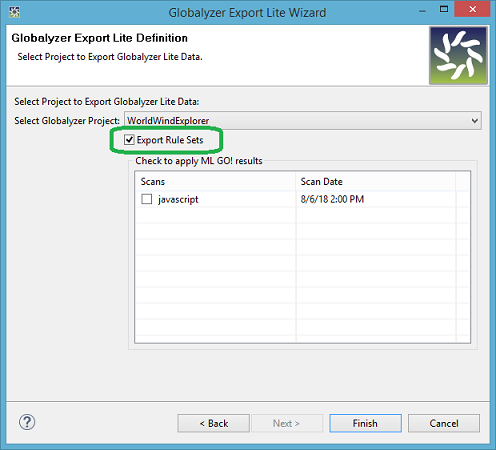Difference between revisions of "Local Rule Sets"
| Line 6: | Line 6: | ||
<br> |
<br> |
||
| − | [[File:Export_rule_sets.png| |
+ | [[File:Export_rule_sets.png|600px]] |
<br> |
<br> |
||
Revision as of 21:33, 6 August 2018
Local Rule Sets is a Globalyzer Lite feature that allows scanning without accessing the Globalyzer Server. Rule sets are stored in local zip files rather than retrieved from the Server.
These rule set files can either be exported directly from the Server and copied to your project-path/lingoport directory, or exported from the Client as an option when exporting your Workbench project to a Globalyzer Lite Project Definition File (Select File->Export->Globalyzer->Export Project Definition (Lite)).
To use Local Rule Sets, set the use-local-rulesets attribute to true in the Lite Project Definition file.
When using local rule sets, you do not need to specify username/password/server information in your Project Definition File.
When using local rule sets, Globalyzer will try to access the rule set on the server if a local rule set is not found and the login information is available,
Use of this feature requires a Globalyzer License to be downloaded from the Server (from the Client Download page) and stored on your local machine. Place this license file in the following default locations, per OS:
- Windows - C:\Lingoport
- Linux - {userhome}/lingoport
- Mac - /Applications/Lingoport
Best Practice
- From the Workbench, export the the Lite project definition file and Local Rule Sets in the lingoport directory under the top level directory of the repository.
- Commit/Push the lingoport directory with the local Rule Set(s) and the project definition file to your repository
By following this practice, you ensure that the Rule Sets are maintained together with the source code; When either a CICD system or a developer with an IDE with Lite use the Locale Rule Sets to scan the code, the location of the files is standard and no specific customization is needed.
